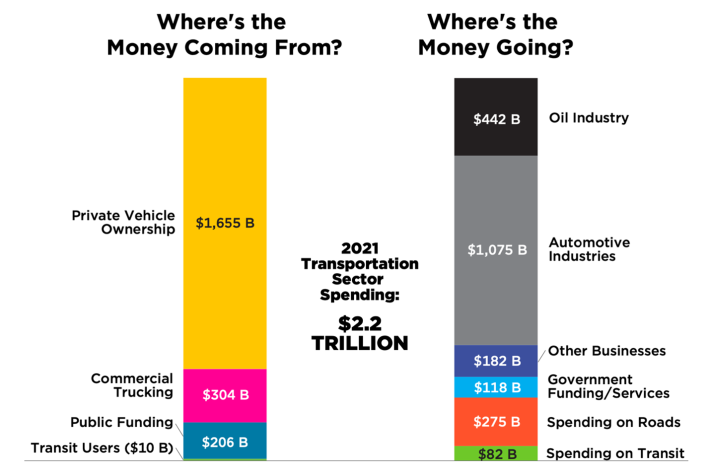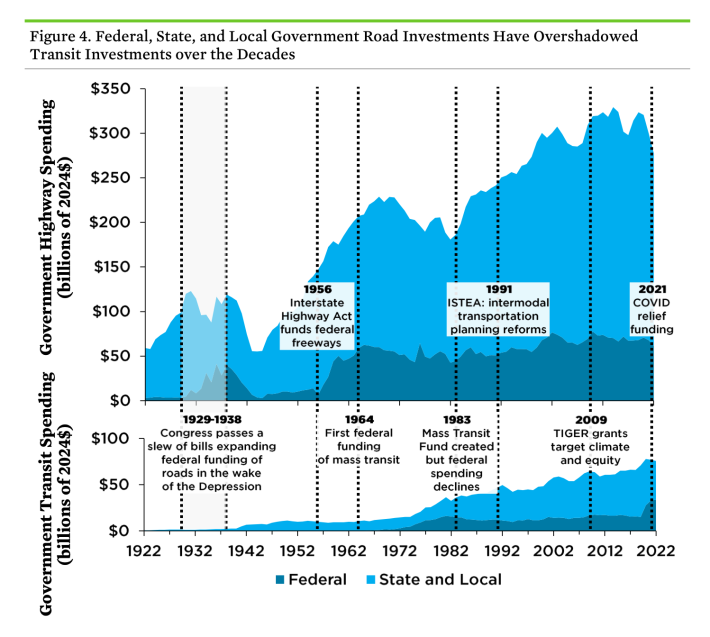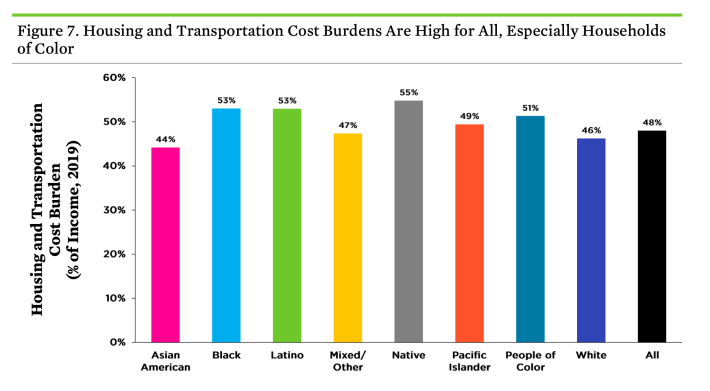Strong policies aimed at reducing how much Americans need to drive wouldn't just decarbonize the transportation sector and make our communities more healthy and equitable, a new study finds — it would also save us $6.2 trillion more than focusing on vehicle electrification alone, the vast majority of which will go directly back into the pockets of U.S. residents.
The Union of Concerned Scientists' provocatively titled report, "Freedom to Move," states that giving Americans the freedom to choose among multiple modes of travel is "key to the climate transition" — and that making "visionary but feasible" changes, like shifting land use patterns and investing in walking, biking, and transit, could get our country to the critical net zero milestone.

More specifically, the report says that by slashing vehicle miles traveled by about 27 percent from 2035 to 2050 — an amount lower than the VMT reduction goals already in place in California and Washington — America wouldn't have to build about $201 billion in new energy infrastructure that would be necessary to power millions of electric cars and the gas-powered cars that would still be produced as the fleet transitions.
It would also save the country $128 billion in avoided public health costs from tailpipe emissions, as well as the fine pollutants like tire particles and brake dust that heavier electric cars emit even more of. And then there's the staggering costs of car crash deaths themselves, 250,000 of which could be avoided if VMT was cut, along with 3.7 million crash injuries that often cost far more than a fatality.
Most staggeringly, though, U.S. residents would save a collective $5.9 trillion in avoided car payments, fuel, insurance, and other vehicle-related costs if we took car dependence seriously — even if most households didn't give up driving outright.
"What we find is that reducing VMT and making sure to provide more transit options would be the most equitable way to make these kinds of changes, and would provide the most benefits to the people out there," said Kevin Shen, the lead author of the report. "And even in more car-oriented communities, this doesn't mean that everybody has to ditch their car. It could just mean that ,instead of buying a second car per household, you shed a car. Or a certain percentage of your trips to the grocery store or to the doctor are met by an e-bike, because your town is is planned [so that] the places you've got to go are more centralized."

Even if he believes that reducing car dependence is within our reach, Shen acknowledges that doing so will require fighting against roughly a century of car culture and all the biases it's ingrained.
Virtually since they were first created, the researchers say that autocentric industries have been "rigging the rules to constrain our options to only driving fossil-fueled cars," and that dismantling their influence will be a steep uphill battle. In 2023 alone, the auto, fossil fuel, and road-building industries spent a whopping $104 million in documented lobbying time and $14 million more in political contributions — and those were only the lobbying groups that signed onto a single letter that successfully opposed a rule that would have required states to report their transportation-related greenhouse gas emissions.
All that lobbying, though, hasn't just won government subsidies for highways that have dwarfed transit spending for generations. It's also created a car-dependent world where the American people are functionally required to line the pockets of automakers and oil companies, or else sacrifice opportunities and basic resources that are only reachable with a private automobile.
Put it all together, and the researchers say that auto and oil industries "receive up to around 75 percent of all the money – private and public funds — that we spend on transportation."
"This is not just a 'today' problem. ...The automotive lobby has [mounted] a very coordinated campaign for years," continued Shen. "They used all these arguments to try and reframe what the use of the street should be, like the term 'jaywalker.' And in general, this campaign wound up making it so that streets were no longer for people in all sorts of different modes, but largely privileged fast-moving automobiles. Anything defying that norm was seen as morally wrong."

Building enough energy infrastructure to electrify our car-dependent status quo, though, won't be easy, either — and it will be far more expensive and less equitable than the alternative, especially for America's most vulnerable communities.
The researchers point out that roughly 30 percent of U.S. residents don't drive, whether because they are too young, because they have disabilities that make driving impossible, because they can't legally get a license, or even because they simply can't afford to. About 60 percent of Americans live in neighborhoods where the combined costs of housing and transportation are unaffordable, the researchers found, and people of color were 14 percent more likely to be cost-burdened by these basic necessities.
"We titled our report 'Freedom to Move' for a reason," added Shen. "Freedom has long been associated with automobiles. ... But we envision a different kind of future: one where invoking the word 'freedom' doesn't mean just 'freedom to drive,' but the freedom for everyone to have choices."

If America can understand the massive benefits of ending car dependence before it's too late, Shen and his fellow researchers hope we can chart a better course to curing climate change — even if their own field has played a role in putting us on our current path.
"Especially as the Union of Concerned Scientists, we have to bring up that for the longest time, the car-dependent status quo has been propped up by antiquated science and modeling," he added. "[But] if you look into the more recent research [about] what actually benefits people in the U.S., it is not automobility. Providing a multitude of options — that's what actually benefits people."






